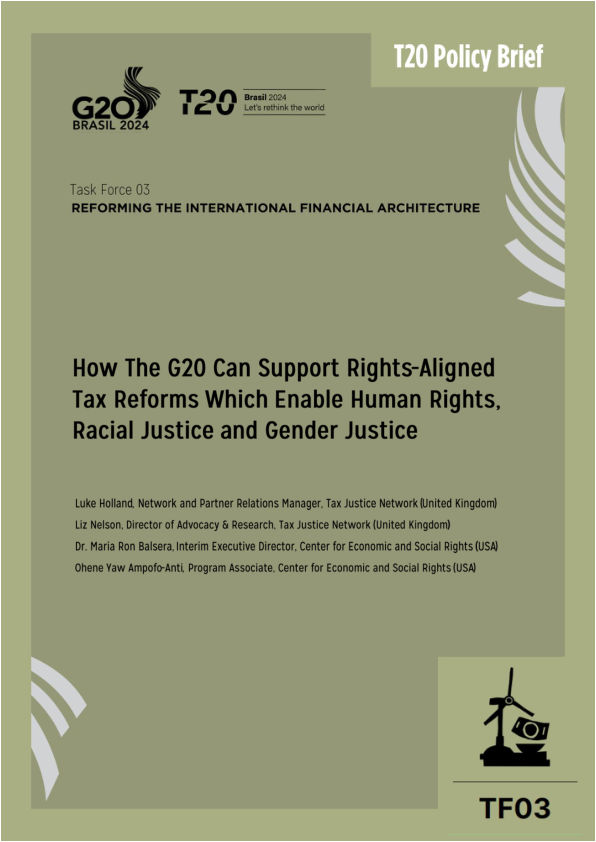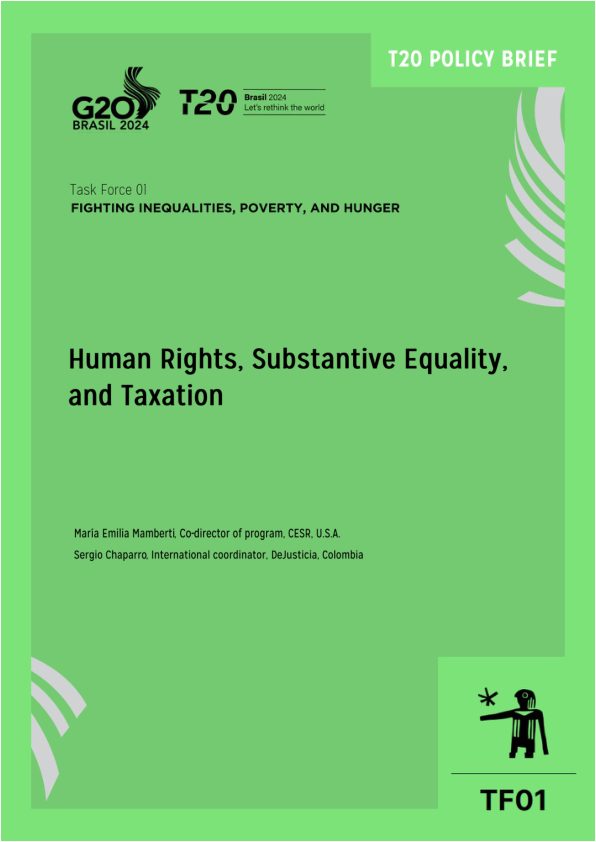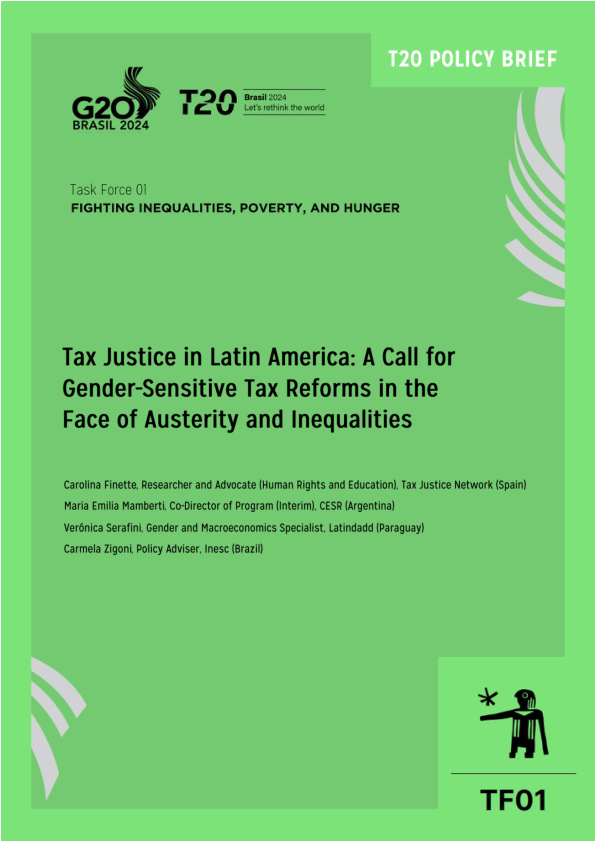Following a call from the T20, CESR and its allies are urging the G20 to prioritize rights-based tax reforms that advance gender and racial justice.
As the G20 summit approaches, CESR and its partners are intensifying efforts to push for transformative tax reforms that prioritize human rights, gender equality, and racial justice. These calls are being amplified through Think20 (T20), an engagement group that brings together think tanks and research centers worldwide. Along with Latindadd, Tax Justice Network, Dejusticia, and INESC, CESR produced discussion pieces to urge world leaders to adopt progressive tax policies that address deep-rooted inequalities.
Tax Justice in Latin America: A call for gender-sensitive tax reforms
Latin America faces profound challenges: debt burdens and austerity measures have exacerbated economic and gender inequalities. This brief, co-authored with Latindadd, Tax Justice Network, and INESC, outlines how tax reforms prioritizing women and marginalized communities are crucial to addressing these disparities.
The text addresses key issues that highlight how regressive tax regimes, particularly the overreliance on indirect taxes such as VAT, place a disproportionate burden on low-income women. In addition, tax evasion and corporate tax abuse drain critical resources that could otherwise be allocated to public services and the improvement of women’s rights. Austerity measures further exacerbate the situation by undermining women’s economic autonomy and reinforcing gender inequalities, leaving those already marginalized even more vulnerable to the negative effects of fiscal imbalances.
Women and marginalized communities bear the heaviest burden of these regressive policies, making it imperative to advance progressive, gender-sensitive taxation to alleviate these inequalities.
Our recommendations:
-
Implement progressive taxation to reduce the regressive impact of indirect taxes on low-income populations.
-
Ensure gender-sensitive fiscal policies, focusing on increasing direct taxes and reducing corporate tax expenditures that disproportionately benefit wealthier sectors.
- Support global tax cooperation through the UN’s new Framework Convention on Tax to create a more just and inclusive international tax system.
The role of the G20 in enabling racial and gender justice
In collaboration with the Tax Justice Network, CESR has co-produced a policy brief that highlights the human rights implications of global tax governance, particularly the shortcomings of the OECD’s two-pillar solution. As wealth disparities continue to grow, this brief outlines the critical need for tax reforms that promote equality, justice, and accountability.
The brief emphasizes that G20 countries have a unique opportunity to champion tax reforms that align with human rights principles. To address both vertical inequalities, such as income and wealth, and horizontal inequalities, including race and gender, tax policies must prioritize redistribution and fairness. A central recommendation is for G20 nations to support the development of a UN Framework Convention on Tax Cooperation, which would provide a more inclusive and equitable platform for global tax negotiations.
Our recommendations include:
-
Ensure policy coherence to align taxation with human rights and equality principles.
-
Support the development of a Framework Convention on Tax Cooperation at the United Nations.
-
Initiate global discussions on wealth taxation to address growing inequalities.
-
Commit to enhancing progressive taxation at the national level, ensuring that tax systems are fair and redistributive.
Human rights, substantive equality, and taxation
In partnership with Dejusticia, CESR also produced a second policy brief that explores the connection between human rights and taxation, addressing the global inequality crisis. In an era of escalating wealth disparities, the brief lays out a framework for using taxation to advance human rights and promote economic equality.
The key takeaways emphasize that human rights offer a binding framework to align fiscal policy with the principles of equality, justice, and accountability. To achieve this, tax policies must be reformed to address both vertical inequalities, such as income and wealth, as well as horizontal inequalities related to race and gender. Additionally, G20 countries should support the creation of a Framework Convention on Tax Cooperation at the United Nations, which would democratize international tax governance and promote more equitable global tax practices.
Our recommendations include:
-
Ensure policy coherence to mainstream equality considerations in taxation.
-
Support and endorse the process of building a Framework Convention on Tax at the United Nations.
-
Start discussions to introduce a global approach to tax wealth.
-
Commit to enhancing progressive taxation domestically.



